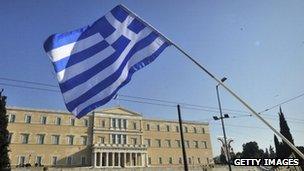Eurozone group backs second Greek bailout
- Published

Greece underwent the biggest government debt restructuring in history
The eurozone group has backed Greece's second bailout of 130bn euros ($171bn; £109bn) pending a contribution from the International Monetary Fund (IMF).
Finance ministers from the 17-strong currency bloc had been meeting in Brussels to approve the package.
The meeting followed Greece swapping most of its privately-held bonds with new ones worth less than half their original value.
Greece's debt-to gross domestic product ratio is also expected to fall to 117%.
The chairman of the eurozone group of finance ministers, Jean-Claude Juncker, who is also the prime minister of Luxembourg, made the prediction after the meeting, saying it would reach that level in 2020.
Mr Juncker said: "We welcome the [IMF's] proposal to recommend a 28bn euros [contribution] to the Greek facility. We look forward to the discussion and the decision by the IMF board on March 15."
He said he was confident the IMF would agree the money but that he was "still dependent on that decision".
"Against this background, we approved the launch of the second programme, pending the completion of the national procedures."
Steps
The BBC's World Economics Editor, Andrew Walker, said the move was just one of the steps to be taken before Greece could get hold of the bailout money: "At this stage, it's only a political commitment, we have still to have another meeting of deputy finance ministers on Wednesday, and we still have to get final word from IMF that they are going to go ahead with some sort of donation to this programme, something that Christine Lagarde [the IMF managing director] has indicated she is in principle in favour of doing."
Greece implemented the biggest debt writedown in history on Monday, swapping the bulk of its privately held bonds with new ones worth less than half their original value.
The Eurogroup includes eurozone finance ministers, the president of the European Central Bank and European Commission chiefs.
Spain's financial status was also on the agenda and finance ministers agreed to allow Spain a bigger 2012 public deficit to 5.3% of GDP, higher than the original target but below the 5.8% Spain originally wanted.
Jean-Claude Juncker said the more important figure was the target of a 3% deficit by the end of next year.
Earlier this month, Spain said it would miss a deficit target of 4.4% of GDP for 2012 agreed with Brussels.
Spain was earlier praised by Germany's Finance Minister, Wolfgang Schaeuble.
The country is planning 30bn euros of spending cuts this year, at a time when its economy is contracting.
The Spanish government is under political pressure at home. Over the weekend, hundreds of thousands of people protested against government labour reforms.
Under the new rules, severance pay will be slashed and it will be easier for firms to opt out of national pay agreements negotiated by unions.
Debt swap
The Greek deal with banks and other lenders is the largest restructuring of government debt in history, clearing the way for the country to receive a bailout worth 130bn euros.
Under the debt swap, banks and other financial institutions have agreed to exchange their existing Greek government debt for new bonds, which are worth much less and pay a lower rate of interest.
The deal involves 172bn euros' worth of bonds, according to the Greek government website, with investors taking a total loss of up to 74%.
The new Greek bonds slumped in value on Monday, trading at 71-75% lower than face value on the secondary markets.
New Greek bonds with 30-year maturities issued with yields of 3.65% were yielding 13.57% on Monday, with investors demanding a far bigger percentage return on their investments.
Some lenders who lost money as a result of the swap will be compensated after the International Swaps and Derivatives Association classified the deal as a "credit event", triggering insurance payments.
Some investors bought a type of insurance against that happening. Those payouts could be worth in total up to $3.2bn, only a small fraction of the 105bn euros wiped-off Greece's debt burden.
In another development on Monday, lawyers in Germany representing 110 Greek bond holders said they had formed a class action group to sue banks and the Greek state following the bond swap.
A Hamburg legal firm said most of the investors had spent 100,000-500,000 euros on Greek paper, with the highest investment reaching 3m euros.
It did not name any of the banks it might target and the suit is likely to be filed in Washington.
It will claim banks failed to advise clients properly about the risks of Greek paper and it will seek compensation.